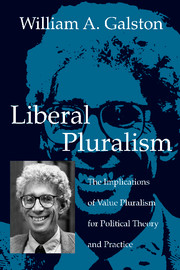Book contents
- Frontmatter
- Contents
- Acknowledgments
- LIBERAL PLURALISM
- I INTRODUCTION
- II FROM VALUE PLURALISM TO LIBERAL PLURALIST THEORY
- III THE PRACTICE OF LIBERAL PLURALISM
- 7 Democracy and Value Pluralism
- 8 Parents, Government, and Children: Authority over Education in the Liberal Pluralist State
- 9 Freedom of Association and Expressive Liberty
- 10 Liberal Pluralism and Civic Goods
- Index
7 - Democracy and Value Pluralism
Published online by Cambridge University Press: 20 March 2010
- Frontmatter
- Contents
- Acknowledgments
- LIBERAL PLURALISM
- I INTRODUCTION
- II FROM VALUE PLURALISM TO LIBERAL PLURALIST THEORY
- III THE PRACTICE OF LIBERAL PLURALISM
- 7 Democracy and Value Pluralism
- 8 Parents, Government, and Children: Authority over Education in the Liberal Pluralist State
- 9 Freedom of Association and Expressive Liberty
- 10 Liberal Pluralism and Civic Goods
- Index
Summary
INTRODUCTION
My overall thesis in exploring the relationship between democracy and value pluralism is this: If there are good reasons to take value pluralism seriously, then it becomes more difficult to accord democracy the unquestioned normative priority it typically enjoys in both ordinary and philosophical discourse. Not only is the scope of democratic political authority restricted; certain alternatives to democracy within the sphere of politics must be taken more seriously than they usually are.
This may appear a strange venture. For many (theorists and citizens alike), the standing of democracy is, like slavery, a settled question. What good can be done by reopening it? Surely twentieth-century experience has taught us that democracy is preferable to any other mode of government. If theory raises doubts about democratic practice, so much the worse for theory.
It is not my intention to mount an assault on democracy. But I do want to suggest that when democracy overreaches, other important values can be imperiled. I also want to suggest that more careful attention to political experience (including our own) yields a more nuanced account of the types of governance we find justifiable in practice.
As a logical matter, the broad implication of value pluralism is clear. If there are no overriding values, then democracy cannot be such a value. If it is not, then statements of the form “X promotes (or sustains, or is most consistent with) democracy” are not sufficient to warrant the conclusion that “X is, all things considered, what we should do.”
- Type
- Chapter
- Information
- Liberal PluralismThe Implications of Value Pluralism for Political Theory and Practice, pp. 81 - 92Publisher: Cambridge University PressPrint publication year: 2002



